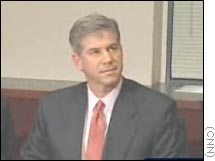|
Fastow becomes the enemy
OCT. 24, 2001
NEW YORK (FORTUNE) - To Ken Lay and Jeff Skilling, Enron's CFO wasn't always the bad guy. Indeed, Fastow was a longtime Skilling protege, and Lay had always viewed him as indispensable. In fact, after Lay became CEO again, one of his early moves was to negotiate a lucrative extension of Fastow's contract. In his recent Houston speech, Lay repeated his claim that it was Fastow who had done in Enron, that it was the revelation of the CFO's larcenous behavior -- "the stench of possible misconduct by Fastow" -- that had triggered the "run on the bank" that sank the company.
This argument simply rewrites history. Fastow was indeed lining his pockets far more than Lay or Skilling knew -- as it turned out, in illegal ways, to the tune of $60.6 million. But it wasn't what Lay and Skilling didn't know that panicked Wall Street. It was what the two men did know, and had repeatedly authorized: the notion that Enron's CFO was doing private deals with his own company, and what those deals might be hiding about Enron's financial condition. During the fall of 2001 investors weren't worried about how much money Fastow had made or even stolen. They were panicking about how Fastow's private off-balance-sheet partnerships might be inflating Enron's earnings and hiding its debt. And rightly so. Until late October, all of the Enron executives' interests were aligned. Indeed, when a series of Wall Street Journal stories began spotlighting Fastow's role running two partnerships known as LJM1 and LJM2, Lay vehemently defended Fastow and the arrangements in the face of a growing outcry. "I and the board of directors continue to have the highest faith and confidence in Andy and believe he is doing an outstanding job as CFO," Lay declared during an Oct. 23 conference call with Wall Street analysts and investors. The very next day, Fastow was gone. So Oct. 24, 2001, marks the moment when Fastow's interests finally began to diverge from those of Skilling and Lay. In early 2004, Fastow pleaded guilty to two counts of conspiracy and agreed to a ten-year jail sentence. But in his much-expected prosecution testimony -- the first full airing of Fastow's account -- he is unlikely to embrace his former bosses' version of reality. People who know Fastow, a temperamental man, say he is furious about the public efforts to blame him for Enron's collapse. He will probably note that on three separate occasions Lay, Skilling, and the Enron board voted to waive the company's code of conduct so that Fastow could run the partnerships. We may also hear Fastow repeat what he claimed in an internal meeting before he left Enron, that the private partnerships were Skilling's idea. Next: JULY 30, 2004 Ken Rice breaks ranks ____________________________ The former Enron chiefs fear a Houston trial may be their downfall -- full story here.
For all the latest headlines in Companies, click here. |
|

